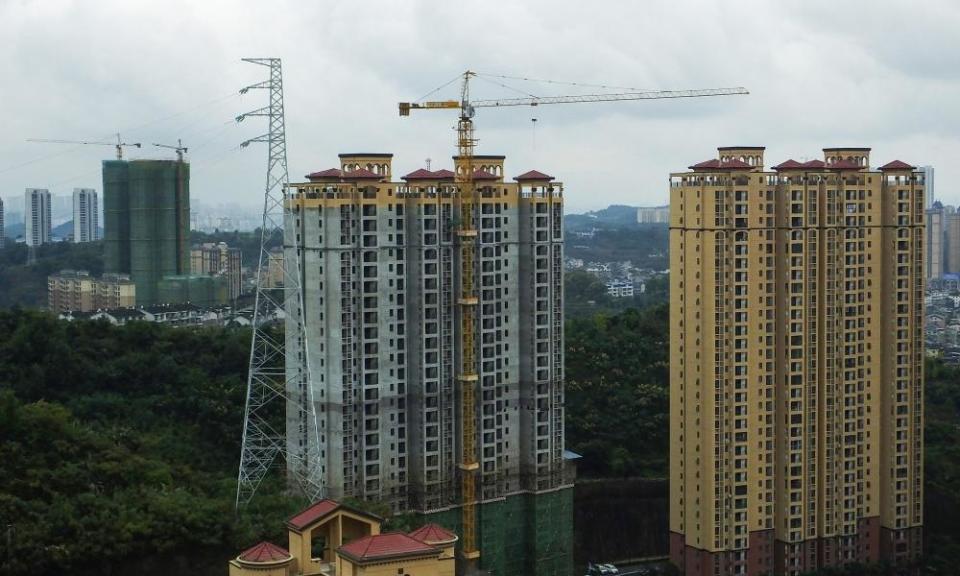Third of Chinese developers could face debt problems as Evergrande contagion grows – report

One third of China’s property developers will struggle to repay their debts in the next 12 months, according to a new report, as the sector reckons with increasingly serious headwinds from falling sales, restricted access to credit and a wider downturn.
Even if the embattled developer Evergrande manages to meet its latest debt repayment on Friday and head off a potentially disastrous default, analysts at the credit rating agency S&P warned that many other property companies could be heading towards bankruptcy.
The financial contagion sweeping through the sector represents a serious risk for China – and the global economy – as its investment and construction driven model of growth begins to creak under the strain of mind-boggling debts.
Related: China’s booming real estate market could spell trouble for the economy | George Magnus
China has suffered housing market downturns before but this one is set to be “unusually intense”, S&P said.
Although Evergrande has emerged as the symbol of the debt-laden structure with liabilities of $300bn at home and abroad, the Chinese property sector as a whole owes an estimated $5 trillion, according to analysts at Nomura. That is one-third of the country’s entire GDP and roughly equivalent to the whole output of the Japanese economy, the world’s third largest.
Property companies must come up with $92bn as bond payments mature in the next year. This task has been made much more difficult because many were cut out of conventional borrowing channels after Xi Jinping’s “three red lines” crackdown on lending to the sector. Some have seen their credit-worthiness ratings cut to “B” or below, which denotes that the company is vulnerable.
“We believe that defaults will rise as firms enter a prolonged down cycle, amid heightened refinancing risk and steep maturity walls coming due this year and next,” S&P says in its report this week.
“In the most severe scenario, the liquidity of as much as one-third of rated Chinese developers will come under pressure. The entities most at risk are overwhelmingly rated ‘B-’ to ‘B+’. Over 50% of our rated portfolio of Chinese developers falls into this ratings category.”
The S&P analysts believe Evergrande is likely to default on its debt eventually. It met the deadline for its last major offshore bond repayment of $83.5m on 23 October, but only at the last minute and when it had used up a 30-day grace period after first missing the payment in September.
Its latest 30-day grace runs out on a $44m bond payment on Friday or it risks entering official default – a scenario with the potential to send a wrecking ball through a sector that represents at least 25% of China’s entire economic output. And it must come up with another $148.13m by 11 October to keep the company intact.
A smaller developer, Kaisa, is another firm under the spotlight after being downgraded to CCC rating by S&P on Wednesday night. After Evergrande, it owes the most to foreign bondholders, with debts of $12bn.
“We view Kaisa’s capital structure as unsustainable given the company’s sizable near-term debt maturities, weakening liquidity, and inadequate free cash flow through 2022,” S&P analysts said. “We believe the company has high refinancing risk.”
Bondholders have been trying to extract information about Evergrande’s financial situation since its financial death spiral become clear in September when it admitted that it might not be able to meet all its debts, which include an obligation to finish up to 1.6 million homes in China that it has already taken payment for.
Attempts to offload its most profitable assets have been unsuccessful and it cannot sell enough homes – even at discounts – because the whole housing market is on the skids. This year has seen the longest slump since 2015 in new construction starts, while property sales by floor area dropped 15.8% in September, the third monthly decline in a row. New mortgages are down 9% this year.
Capital Economics warned this week that China’s manufacturing and construction sectors were “on the cusp of a deeper downturn that could pull down China’s growth to just 3% next year”.
John Kicklighter, chief strategist at the market data and research firm DailyFX, said Evergrande and other struggling companies such as Kaisa, Sinic and Fantasia, were only doing the bare minimum to keep afloat and that the crisis could widen.
Related: Hong Kong doubles down on Covid restrictions to fall into line with mainland China
“Evergrande should be seen as a possible global threat rather than just ‘China’s problem’,” he said. “The company is systemically important to the Chinese financial system that had seen its rules eased during the last financial crisis (2008) and levels of gearing explode in turn. Under such circumstances, moderate risks can turn into universal hazards.”
A group of advisory firms have taken the first step to arranging talks between Evergrande and its offshore creditors, according to Bloomberg, raising the prospect of more clarity on when and how the company might meet its liabilities.
China’s regulators also asked companies this week to proactively prepare for repayment of both principal and interest on their foreign bonds and to “jointly maintain their own reputations and the overall order of the market”.
There were also intriguing reports this week that Xu Jiayin, the billionaire founder of Evergrande and once China’s richest man, had been told by the authorities to dip into his pocket to repay the company’s debts himself.

 Yahoo Finance
Yahoo Finance 